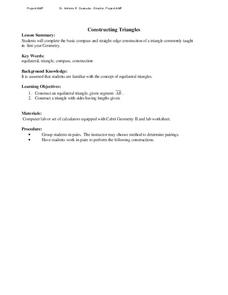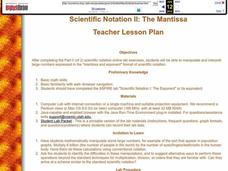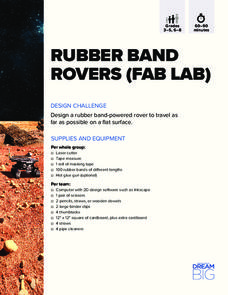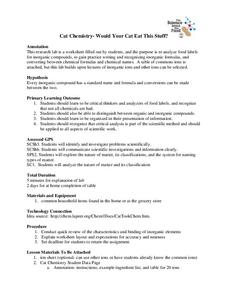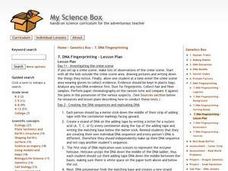Chicago Botanic Garden
Are All Plants Created Equal?
Photosynthesis requires energy and produces food, and cellular respiration produces energy and requires food. An interesting lesson analyzes the factors that affect the rates of photosynthesis and respiration. Classes spend one day...
Utah Education Network (UEN)
Microwave Magic
The microwave is a staple in many American households, but how exactly does it work? Approach this question from a scientific and practical standpoint, and discover cooking strategies, recipes, and methodologies for the standard microwave.
American Chemical Society
Exothermic, Endothermic, and Chemical Change
Scientists can't observe bonds breaking or forming, so how do they distinguish between exothermic and endothermic reactions? Young scholars complete two experiments to do just that. They monitor temperature change and calculate the...
Teach Engineering
Kidney Stone Crystallization
No one likes kidney stones, but they are very interesting to learn about. The last installment of a three-part unit has learners experiment with different chemicals to see which one inhibits the growth of calcium oxalate crystals (which...
Royal Society of Chemistry
Mass Changes in Chemical Reactions—Microscale Chemistry
What better way is there to introduce conservation of mass than a few simple experiments? Young chemists conduct two chemical reactions, take the masses of reactants and products, then compare their results to determine differences in...
Curated OER
Alcoholic Fermentation Lab
In this alcohol fermentation learning exercise, students design an apparatus to study the alcoholic fermentation of yeast. Once complete, students answer 8 short answer questions.
Curated OER
Precipitation Monitoring
Students monitor the pH level of the precipitation in their local area for one month. In this hands-on activity, students use lab equipment to measure the pH levels and an online tool to track their findings. Ultimately, students seek to...
Curated OER
Constructing Triangles
Students construct triangles. In this geometry lesson, students create equilateral triangles. They also construct triangles where the sides are different. They use the lab to create and move shapes around with the Cabri program.
Curated OER
Critters in the Classroom
Students investigate with sea urchins. For this ocean habitat lesson, students observe sea urchins and other ocean grazers. Students work with lab equipment to examine the anatomy of these creatures.
Curated OER
Capacitors
Students explain the concepts of charge storage and how a capacitor works. They construct a capacitor and measure the stored charge using the appropriate equipment and measurements. They also demonstrate capacitance and how it can be...
Curated OER
Weather Variables Lab
Students examine what happens when air temperature drops and gets closer to the dewpoint. They perform a lab activity which illustrates the effects on humidity, precipitation and barometric air pressure.
Curated OER
Introduction to Photovoltaic Systems
The Green Education Foundation found that this lesson plan, written by the Texas State Energy Conservation Office, is right up their alley when it comes to teaching sustainability. It is ideal as a first lesson plan on photovoltaic...
Serendip
Is Yeast Alive?
Through two investigations, life science learners determine whether or not yeast is alive. They perform tests for metabolism by providing sugar and observing if gas is produced as a byproduct. They incubate some of the sample for at...
Curated OER
Scientific Notation II: The Mantissa
Practice converting a conventional number into scientific notation, and vice-versa. Using an applet, they perform the operations of multiplication and division on numbers expressed in scientific notation.
Curated OER
Density - An Intrinsic Property
Learners discover the property of density while participating in a lab exercise. In this scientific measuring instructional activity, pupils utilize a scale to measure the density of different metal materials. They document their work...
DiscoverE
Rubber Band Rovers
Get your learners interested in space exploration. Groups design space rovers using design software and then build prototypes of their designs. The farther the rovers can travel, the better. The catch? The rovers must be powered by...
Mrs. Burgess
End of the Year Geometry Projects
Geometry students will be ecstatic about these engaging and enlightening end-of-the-year projects! Types of project ideas include interviewing a geometer, an ABCs of geometry poster, an engineering lab report, and origami work.
Texas State University
Earth: Deposition and Lithification
Geology geniuses analyze sediment samples with a hand lens and sort according to physical characteristics. They also learn about the processes of cementation, compaction, and lithification within the rock cycle. The lesson plan is...
Curated OER
Heating and Cooling Curves
High schoolers experiment with a pure substance and a phase change. In this heating and cooling curves lesson plan, students study the effects of heating and cooling a pure substance to observe a phase change. They determine both the...
University of California
Hot! Hot! Hot!
Calories are not tiny creatures that sew your clothes tighter every night, but what are they? A science lesson, presented at multiple levels, has learners experiment with heat, heat transfer, and graph the function over time. It also...
University of Georgia
Would Your Cat Eat This Stuff?
Processed foods use inorganic compounds for flavoring and preservation. This take-home laboratory challenges scholars to find 20 different compounds identified on the labels of foods to list on their data collection sheet. The activity...
Curated OER
Semipermeable Membranes and Bioaccumulation
Beginning biologists place a drop of food coloring into water of differing temperatures to observe the effect on the diffusion rate. They remove the shells from raw eggs and then experiment with osmosis over the remaining membranes....
Curated OER
DNA Fingerprinting
Students study the process of DNA Fingerprinting and how DNA Fingerprinting is used in solving crimes. They examine a crime scenario that involves collecting DNA Fingerprinting information from blood collected at the crime scene. They...
Virginia Department of Education
Aspirin Analysis
Laughter may be the best medicine, but aspirin is also important. Young chemists analyze aspirin tablets using titration in this lab experiment. They then repeat the entire experiment using a different aspirin brand.









